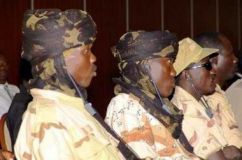Darfur rebels struggle to decide on peace deal
April 29, 2006 (ABUJA) — Sudanese rebel factions on Saturday were seeking a consensus on whether to back or reject a peace deal for the western Darfur region ahead of Sunday’s deadline set by the African Union (AU).
 International pressure grew on all sides in Sudan to accept a draft peace settlement to end a three-year conflict that U.S. President George W. Bush called “genocide”.
International pressure grew on all sides in Sudan to accept a draft peace settlement to end a three-year conflict that U.S. President George W. Bush called “genocide”.
Sudan’s government has already signalled that despite some misgivings it is prepared to sign the 85-page agreement drafted by African Union mediators after two years of tough negotiations on security, power-sharing and wealth-sharing.
“We want to have consensus within the movement before giving our final position,” said Abduljabbar Dosa, chief negotiator of the Sudan Liberation Army (SLA) rebel group.
The rebels have yet to officially respond to the draft, but several leaders have said they are dissatisfied with it.
Their main problem with the document is that it does not meet their demands for Darfur to get a new post of Sudanese vice president and a new regional government. They have other objections on issues ranging from compensation to disarmament.
In the Nigerian capital Abuja, venue of the talks, diplomats made intense efforts to persuade the rebels to drop some of their demands, while in the United States the pressure was on the government of Sudan to end violence.
Bush said “genocide in Sudan is unaccceptable” and endorsed a series of “Save Darfur” rallies taking place across the United States on Sunday, organised by a coalition of more than 160 religious and humanitarian groups.
“I want the Sudanese government to understand the United States of America is serious about solving this problem,” Bush said.
The Bush administration says it has taken the international lead on Sudan, but many experts say it has not been tough enough on Khartoum and has failed to enlist major powers such as Russia or China.
Bush announced new sanctions on Thursday against people suspected of aiding genocide in Darfur.
NATO ministers on Friday said they were ready to increase assistance in Darfur, but agreed any presence would be limited and only in support of AU or U.N. efforts.
HOPEFUL SIGN
A diplomatic source closely involved in the Darfur negotiations said the two factional leaders of the SLA rebel group were talking directly to the government about the draft settlement and this was a hopeful sign.
“My gut feeling is that we’re going to see a deal,” said the source, who did not wish to be named.
Decision-making is an arduous process for the rebels, who are split into two movements and three factions with a history of infighting. Field commanders from Darfur have joined the negotiating teams in Abuja as the factions seek to build a strong, unified response to the proposed settlement.
Majzoub al-Khalifa, head of the government negotiating team, said the Sudanese government accepted the document in principle although it had reservations.
“Even if we don’t solve all our disagreements (before a signature), we can leave some of them for the Darfur-Darfur dialogue or the implementation phase,” Khalifa said.
The Darfur-Darfur dialogue is one of the mechanisms for conflict resolution that is foreseen in the draft agreement.
The SLA and the smaller Justice and Equality Movement (JEM) took up arms in ethnically mixed Darfur in early 2003 over what they saw as neglect by the Arab-dominated central government.
Khartoum used proxy Janjaweed militias drawn from Arab tribes to crush the rebellion. The fighting has killed tens of thousands of people while a campaign of arson, looting and rape has driven more than 2 million from their homes into refugee camps in Darfur and neighbouring Chad.
A truce was signed in 2004 but all sides have continued fighting, according to the AU which has 7,000 peacekeepers in Darfur.
(Reuters)
